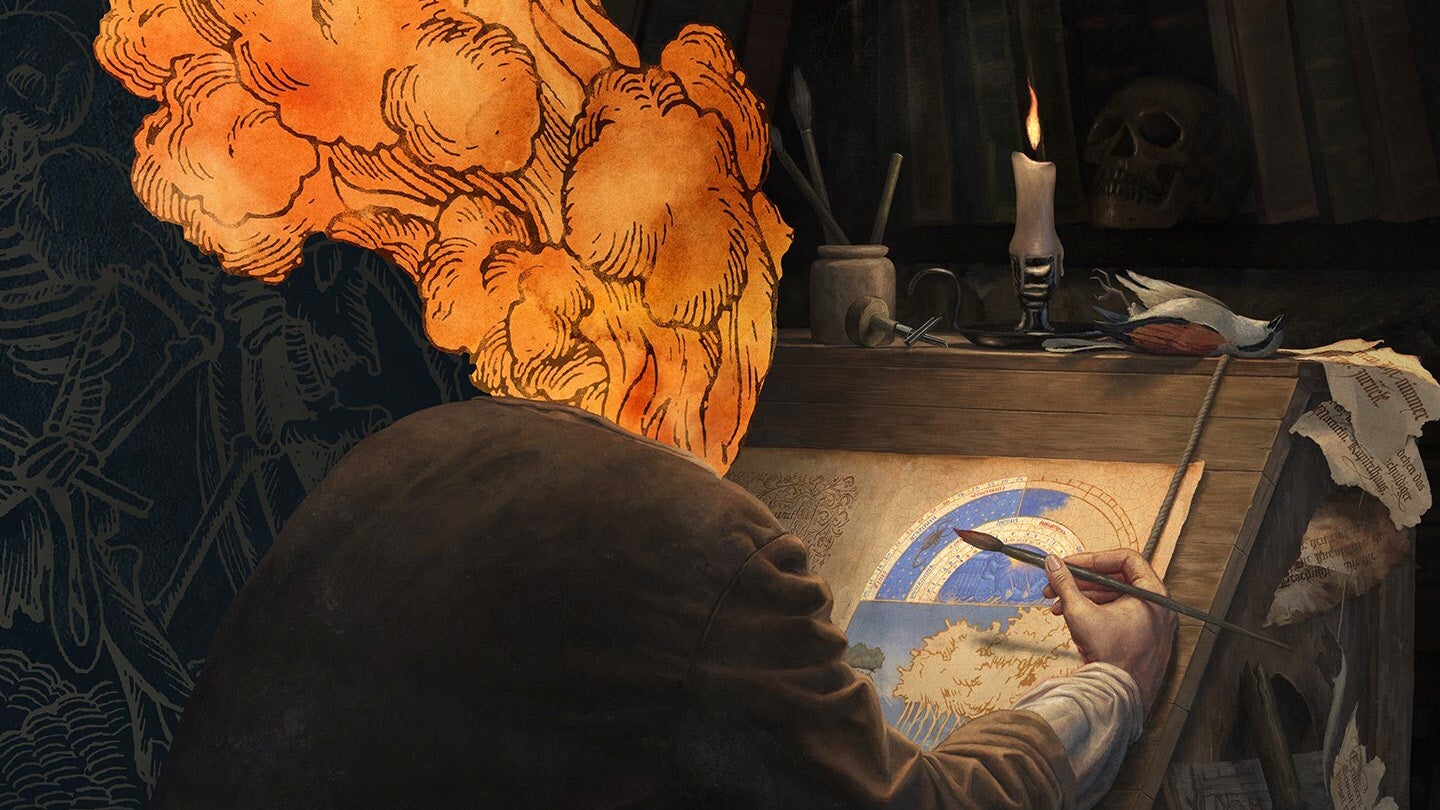[ad_1]

One thing I’ve always loved about the work I do is hearing about people’s lives. I like hearing their stories, I like hearing about the things that shaped them, because they not only relate to me as a fellow human being but inevitably, they are the things that end up shaping what they make. The games they make. The games we love.
It’s a privilege to be able to focus on this in my podcast One-to-One which, hey, you should listen to (search “Eurogamer Podcasts” wherever you get them). And I’ve had some wonderful guests. But few struck me the way Obsidian design director Josh Sawyer did – the lead mind behind Pentiment – in the latest episode.
Sawyer was not what I expected – and I say this as someone who’s met him a few times. But on those occasions I got only a glimpse of him. He demoed a game, or we traded pleasantries while thinking about what work we were doing next – it was that kind of thing. But this time I got a chance to sit with him for a chunk of time and hear about his life, hear about who he is. And there’s much I didn’t know.
To see this content please enable targeting cookies.
I didn’t know, for instance, that he was almost a tattooist. He was doing some web design for a tattoo shop in the ’90s, and the owner decided to pay him not in money but in tattoos, which Sawyer liked. He still likes them. He has around 20 tattoos now, even one on the back of his head. “And then I was like,” he tells me, “‘Oh, maybe I can become an apprentice tattoo artist and I’ll do web design in the meantime.'” What a different outcome that would have been.
Nor did I have any idea he sang. And I mean he properly sings. As in, he went to university to study it. One of the two large manuscript tattoos on his forearms is actually the song he sung to audition with – the poem Silent Noon by Dante Gabriel Rossetti, which was put to music by Ralph Vaughan Williams. And the university he went to was Lawrence University Conservatory of Music – a prestigious place.
But it didn’t last. Sawyer had grown up singing casually with his dad, an acoustic guitar player and a sculptor, and the training he had was no more formal than that. “I had very poor keyboard skills – almost nonexistent,” he says, “and I had no theory skills.” And when he got to Lawrence, it showed. As did his discipline. “I burned out real fast because I was not a serious student and I wasn’t prepared.”
Singing wasn’t his first love, though. His real desire as a child had been to do fantasy illustration. He loved Dungeons & Dragons and wanted to draw the kinds of pictures he saw in manuals and magazines. And again, he got off to a very good start. “I’m from a small town and in the small town, I was winning art competitions,” Sawyer says. “For a middle-schooler and early high school student, I think my drawing skills, my draughtsmanship skills, were pretty good.”
The problem, however, was colour. Sawyer is colourblind and it meant that as colour became increasingly central to the work, he struggled to keep up. That’s where singing came in. And when singing ran its course, that’s where a move to history came in – another lifelong interest – with theatre on the side. But college was never really for him. “I never became a good student,” he says. “I was always goofing around and hanging out with my friends, and hanging out with girls and playing D&D, which sounds like a combination that shouldn’t exist but it was what I was doing.”
It wasn’t until college ended and he faced a mountain of student debt, and a friend notified him about some web design work going at a game company called Black Isle Studios (a legend of ’90s computer role-playing games), that his life started to resemble what we recognise now. And even then, he walked into it oblivious. It wasn’t until he was standing, surrounded by the Planescape: Torment team, making a Dungeons & Dragons computer game, that the proverbial penny dropped. “And I was like, ‘Oh, shit. There’s a lot of people actually making these games, and maybe I could be one of them.'”
I didn’t know any of these things about early-life Sawyer because none of it ever seems to come up. And none of it ever seems to come up because, on the face of it, it doesn’t seem to be relevant. Hearing him talk for 10 minutes about the 12 bicycles he owns doesn’t make me immediately think about Fallout: New Vegas or Pillars of Eternity – two games/series he’s well known for designing and directing.
But indirectly, it absolutely is him, and he absolutely is those games. And in no game is it more apparent than the recent Pentiment. This is as close as he’s come to fully authoring a game. Sure, it was made by a small team of 13 people, and Sawyer praises the impact of art director Hannah Kennedy on it especially, but without him, there would be no originating idea and no game.
You don’t have to look too hard at Pentiment to see Sawyer’s love of art and history. Those big tattoos on his forearms look as if they were pulled directly from the game (they’re not, but still). He loves The Name of the Rose by Umberto Eco, which runs through Pentiment like a river. There’s even a character singing in an Abbey that I wonder whether is Sawyer singing himself. I didn’t think to ask.
Go deeper and you’ll hear about the Darklands MS-DOS game that gave him the idea for a historical RPG in the first place. He once pitched it at Black Isle but the idea didn’t fly – Xbox Game Pass turned out to be the magical ingredient in that regard, that convinced someone to take a chance on it. But there’s a sadder story linked to Darklands, too, about a boy he used to play the game with and who, suddenly, one day, was not there any more. And I think it’s in attached stories like this where a more subtle but no less powerful influence on Pentiment is found.
It comes from the tapestry, if you like, of Sawyer’s life, of wrong turns and regrets and memories. And from what appears to be an endlessly curious mind. Sawyer reminds me of someone I met a few years ago called Phil Campbell, a game designer who had wonderful stories about meeting David Bowie and Marlon Brando while working on games like Omikron and The Godfather. Campbell seemed to be interested in anything and everything, and Sawyer is like that too. Talking to either of them is like being in the company of a bee buzzing around picking pollen: they never stop. They fly to another memory, another interest, another story, endlessly.
And it’s all of this, poured into Pentiment, that gives it an extra dimension and makes it what it is, and that’s warm and funny, poignant and reflective. In that, I can feel Sawyer’s nature for “goofing around”, as he called it, back when he was talking about being at college, as I can feel the more serious and sombre things he’s learned about life as he’s gone along. And it’s this predisposition to be affected by life, by all of life, that I find so fascinating about him. I could talk to him for hours; I think I’d probably need them to hear only a tiny amount of what he has to say.
He is not what I expected, then, but what else should I have expected in a game designer than someone who sponges up the world around them – someone who sponges up one world so they can re-release it into another?
[ad_2]




